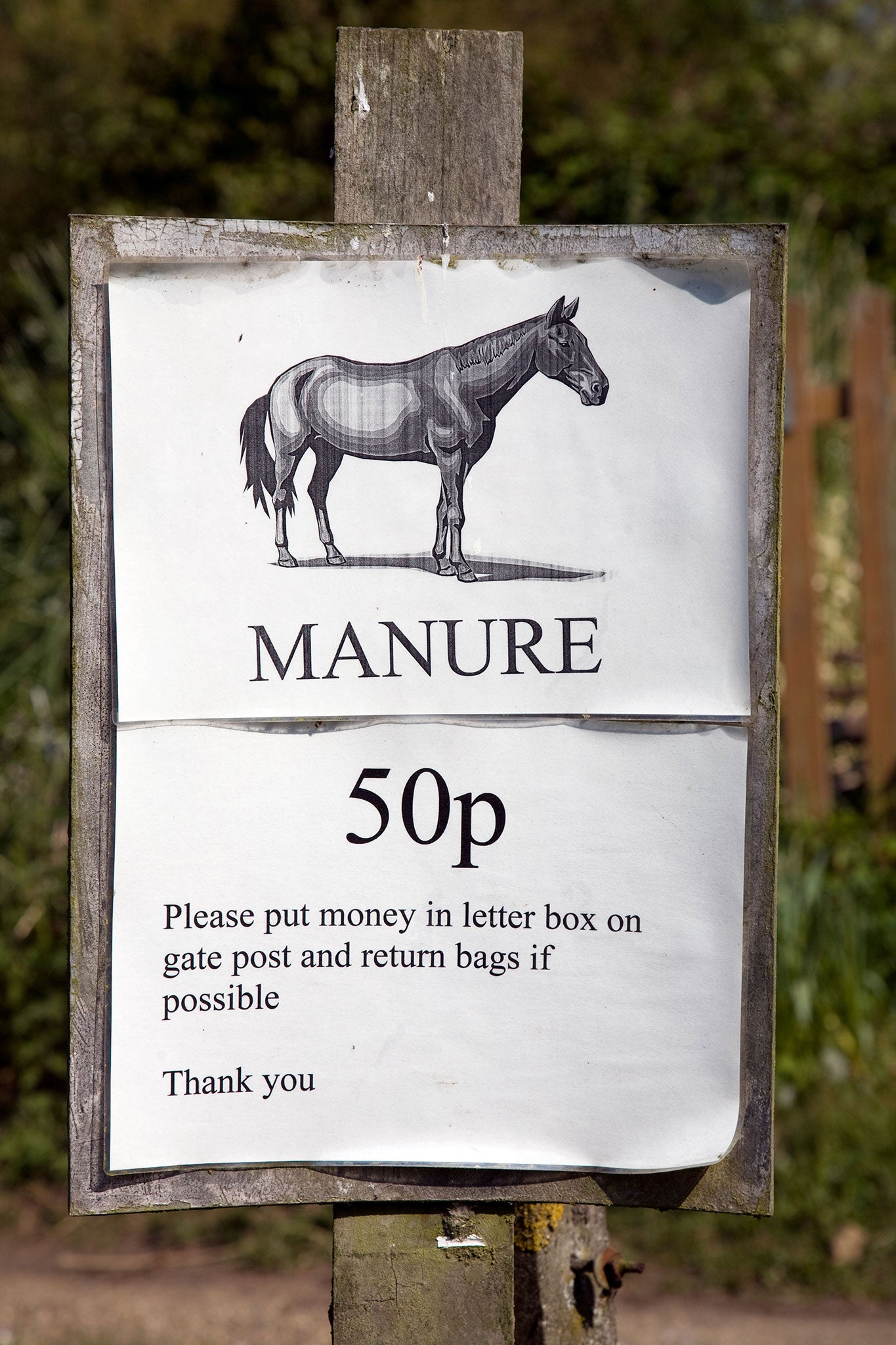The Independent's journalism is supported by our readers. When you purchase through links on our site, we may earn commission.
Emma Townshend: 'Spreading manure on flower beds ticks many boxes'

My garden stinks. I should have realised as soon as I placed the bags of "well-composted" manure in the car at the garden centre that this lofty claim didn't really ring true. "Mum, mum!" came the pathetic cries for help from the back seat. "This is the worst smell that there has ever, ever been in the entire whole world."
"Wind down the window, dearest," I cried cheerfully, putting the car into gear and screeching away in a cloud of black rubber, in the vain hope of leaving the admittedly pungent odour behind us. No such luck. For the stench was with us, and it remained with us for some days.
This was at least partly because the excruciatingly perfumed liquid that seeps out of "well-composted" manure had leaked out of the bag and into the boot. This is lined with a plastic thing you can take out and wash: yes, I have learnt at least one lesson there. However, what I hadn't fully appreciated is that it can leak out of the bags while you're moving them and ON TO YOUR CLOTHES. Super.
Yet, even once removed from the car (and my skirt), the manure still reeked. It reeked in a bag on the path. It reeked in through the door, even when the door was shut. "Ew, your house smells really bad," remarked one six-year-old visitor. And once spread on the flower beds, it continued to reek for about five more days at a level of pungency that attracted flies. Worst of all, my hands ponged, through round after round of repeated handwashing and under-nail scrubbing that would have done an OCD sufferer proud.
There was a point to all this, though. There are lots of different ways to feed your garden, and I'm a fan of all of them, really, but spreading a good layer of well-rotted farmyard excrement on the flower beds ticks a number of different boxes. Particularly at this time of year, a few centimetres of mulched manure provide a water-retention layer, as well as a welcome feed. However, manure that isn't properly rotted down can actually steal nitrogen from your soil, meaning that I may have created more problems than I've solved. (And I don't know if I mentioned it, but I reek.)
So what are the non-stinky options? When buying fertilisers, you need to distinguish between foliar feeds (absorbed through the leaves), soluble feeds for watering, and the evocatively-titled "top dressings" (scattered on the soil). There are also slow-release granules, very useful for pots, letting out nutrients over time (I tend to dig them in whenever I plant something as I am not the most, um, organised of plant feeders). Almost all plant food will also have what's called an "NPK rating" on the box, which differs according to whether you want the plants to fruit (such as tomatoes, which need special tomato feed) or flower (such as roses, which require more potassium).
Lots of gardeners opt for an organic seaweed fertiliser, along the lines of Vitax or Maxicrop. These are vegetarian, but also rich in tiny trace elements that might be lacking in regular brand-name fertilisers. They are also mostly fortified, like breakfast cereal, to get the NPK ratio right. However, all organic fertilisers tend to work more slowly than inorganic ones (Miracle-Gro, for example), their ingredients taking the plant more time to assimilate.
In the end, despite the pong, I'm still unswerving in my belief in manure. Walking around a friend's West Country veg patch a few weeks ago, I admired his lettuces. "Yeah," he laughed, "but look at these, growing in the fresh manure." His poo-fuelled lettuces were properly twice the size. And if that's not a clear lesson, I don't know what is.
Munch bunch: The good feed guide
Roses
Flower better if fed twice a year. Controlled-release pellets stop overfeeding. David Austin gives its roses a final feed, right now, of Vitax Q4 (£9.39, tesco.com).
Tomatoes
These need pretty much constant feeding to shape up properly. At West Dean in Sussex they put 5ml in a watering can daily. Tomorite is £4.80 from tesco.com.
Lawns
Generally greened by a top dressing, scattered monthly until September. Grass should be wet, to avoid scorch. I like Aftercut (£5.49, screwfix.com).
Shrubs
Acid-loving plants such as rhododendrons prefer a different mix. Miracle-Gro does a special pelleted slow-release azalea fertiliser (£6.70, amazon.co.uk).
Join our commenting forum
Join thought-provoking conversations, follow other Independent readers and see their replies
Comments
Bookmark popover
Removed from bookmarks